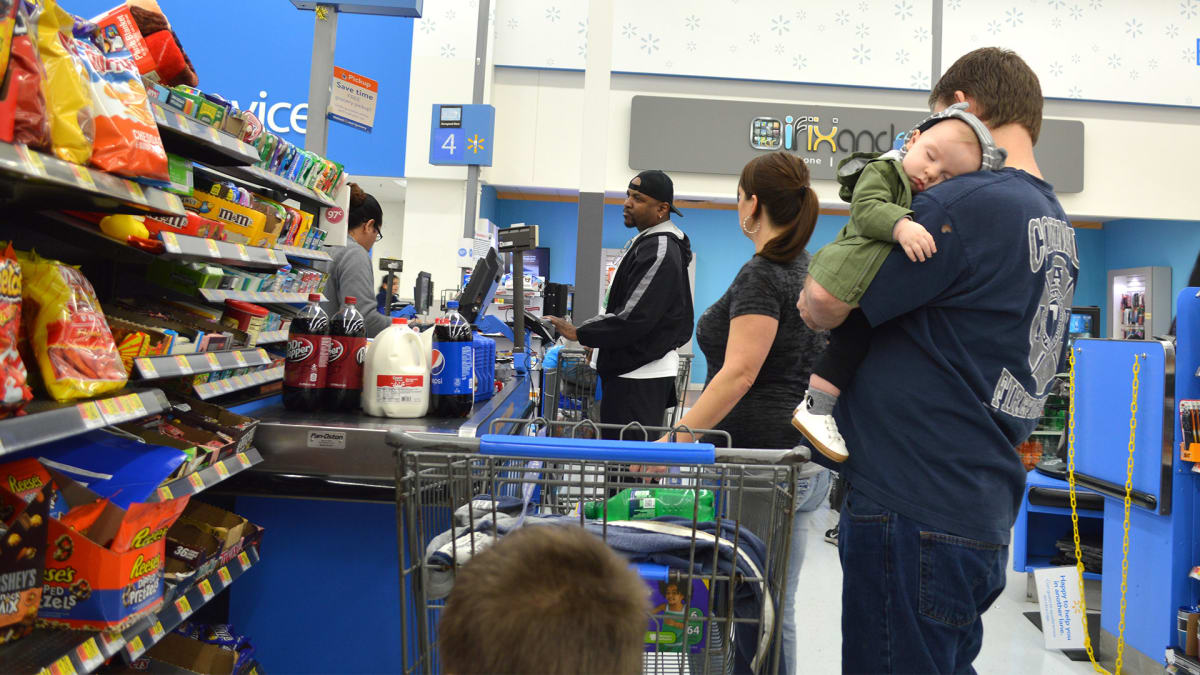
If the economy does take a downturn, is any retailer immune?
In this sneak peek from Action Alerts PLUS, team member Stephen 'Sarge' Guilfoyle said that while Walmart (WMT) may fare better than Costco (COST) in a recession, no retailer will be spared if a serious slowdown in consumer spending occurs.
Find out the retail winners and losers in the video above.
FULL VIDEO TRANSCRIPT:
J.D. DURKIN: Now that we've seen what April had in store with regards to retail, in addition to earnings from names like Target, Walmart, and others, how is the health of the consumer looking to you right now, Sarge?
STEPHEN GUILFOYLE: The consumer's slowing down, I think. I think we saw that they're relying more and more upon revolving credit as a means of sustaining their familial standard or standards of living. That's a problem.
I think we see the-- I'm thinking, anyway, that stocks like Dollar Tree, T.J. Maxx, these are stocks on long. Walmart, which I'm not on Walmart. But the stocks that cater more to a consumer that's on a tight budget probably are going to do better, in my opinion.
We heard from Target that mass theft is an issue. That tells you right there, the consumer is not in great shape. So I'm not all that excited. We saw a little bit of growth for retail sales in April. It was, I think, only the second month in the last seven or so that we actually saw growth. So that was a positive.
But I don't think the consumer is as healthy as a lot of pundits that you see on television think they are. I don't think they're at a point where they're in a state of panic just yet. The unemployment rate hasn't fallen apart. There is still wage growth, although it's not keeping up with inflation. So the consumer probably isn't ready to just throw in the towel, but the consumer, I don't think, can be relied upon going forward. I would be careful.
J.D. DURKIN: And we did see a pullback in some discretionary spending. That was a bit of through line through a lot of the retail numbers that we got, but of course, in favor of essentials. And we certainly the consumer, at least up till now, the data tells us, still wants to experience things, still wants to spend money on traveling, right? There is still some spending, even if we do have that pullback in some discretionary things, like clothing, apparel, home decor, et cetera.
Sarge, a lot of attention got paid to those disappointing results from Home Depot specifically this week. Was there another report or other reports that stood out to you?
STEPHEN GUILFOYLE: Yeah, I actually sold my Home Depot in response to that report. So I was part of that. The next day, it was up. But then it was back down the day after that. Let me see where it is right now. Home Depot is-- oh, it's right at-- OK, it's a little bit higher than where I sold it.
But yeah, what's standing about a lot of the reports is, if you haven't followed it, because there's been a trend, is that the balance sheets for a lot of these big companies stink. I mean, Home Depot's balance sheet is terrible. Target's balance sheet, terrible. Walmart's balance sheet, terrible.
These firms have put themselves in positions where their balance sheet is no longer a source of strength, which really, that's why I'm not watching any of these names right now. Because for many years, I was a big proponent of Walmart. And Home Depot was one of my stocks for probably decades. But I just don't think we can trust these big box, large chain retailers the way we once did. I don't think they have the strength within their own fundamentals.
J.D. DURKIN: I'm going to throw out another question for you I don't if you were expecting. Is Walmart-- since you mentioned Walmart, many people say this is the ultimate recession-proof stock. Let's pull together our conversations. Any of the names you just listed you view as more or less recession-proof, given what could be ahead, Sarge?
STEPHEN GUILFOYLE: I wouldn't say they're recession-proof. They're more recession-proof than their direct competitors. Certainly, more rec-- well, I was going to say more recession-proof than Costco. You really can't-- Costco is a little overvalued. You can't say that they're not recession proof, though, because they do sell discounted items in bulk.
Like I told you, I like T.J. Maxx because they buy inventories at a cheap price and sell them to consumers who are probably on a tight budget. I like Dollar Tree for the same reason. Ross Stores is another one, one of those types of stocks. I think those kinds of stocks where you can get a lot for a little, those are the ones that will be more recession-proof, but I don't think anybody is recession proof.
I mean, if you see an unemployment rate that rises above 5% to 6%-- I mean, we used to think 5% was full employment, right? So it can go a lot higher. We know it can. If we get into that kind of spiral, then we're all going to get hurt. I mean, you might have places where you get hurt less. But we'd all get hurt across all asset classes.







